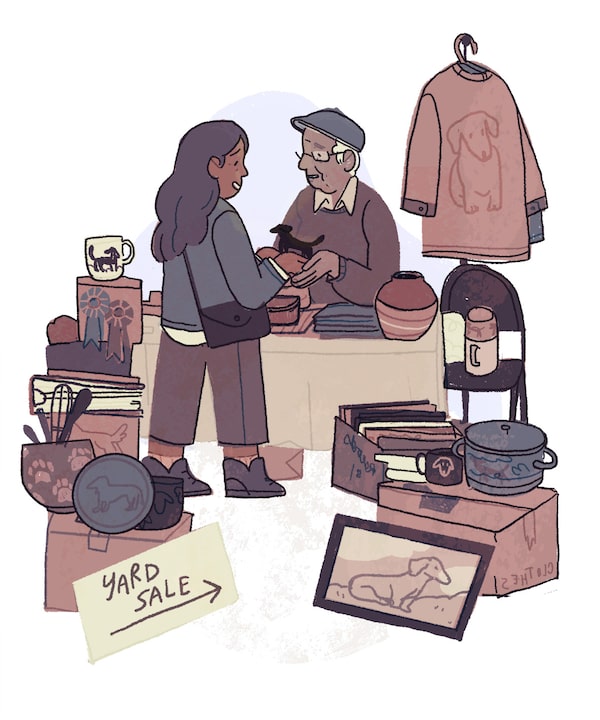First Person is a daily personal piece submitted by readers. Have a story to tell? See our guidelines at tgam.ca/essayguide.

Illustration by Marley Allen-Ash
Saturday morning yard sales are a summertime staple in my part of Canada. For my daughter and me, it has become one of our weekly summer rituals. But last year, something changed about the way I approached the sellers. I started noticing that often the people standing alone behind the tables were grieving.
It took a while for me to figure this out. Our weekly ritual goes something like this:
By Thursday, the ads are up on Facebook with enticing but often truncated details (Lots of kitchen stuff! Kids’ toys! Some farm equipment!) and specific rules (Drive to the cottage at the very end of the lane. No early birds). Then the comments start rolling in (Does the stand mixer work? Is it ‘rain or shine’ or what’s the rain date?). We start visualizing our haul before we are even in the car (”Will there be an Instant Pot this week?”) and reminiscing about past bumper crops (”Remember that awesome one on the Upper Smith Road where everything was 25 cents?!”).
On Saturdays, we are up at 7, coffee in hand and car snacks packed and drive out of our cottage road for the adventure. My daughter has already loaded a map onto her phone and feeds me snacks as I navigate country highways and small cottage lanes. We can spot our fellow yard salers a kilometre away: a conglomeration of cars parked precariously along the highway’s shoulder indicates we’ve arrived.
We love coming across unexpected sales, too. These particular treasures are the ones simply marked with a cardboard sign at the end of an otherwise unremarkable road. Sometimes balloons help pull our attention to the sign.
But last year, something important changed.
One day, as always, we trundled out of the car and walked through a stranger’s driveway toward a length of tables covered in household items. An older gentleman was sitting behind his offerings. We greeted him in the usual way: “Mornin’! Beautiful day for a yard sale!”
And then, I registered what he was selling. In addition to the standard fare (mugs, cooking utensils, puzzles), the tables were covered in dachshunds: figurines, plates with dachshund faces, mugs with dachshunds. I stopped. Paused.
“You really like dachshunds!” I said.
“Yup,” the seller replied. “We used to keep them. We even had a kennel. Until my wife died.”
I stopped and switched my attention from the goods for sale to the seller. “I’m so sorry to hear that.” Pause. “When did she die?” Pause. “What was her name?” Pause. “How are you?”
The gate slowly and carefully opens and his story flows out. His oldest child died eight years ago. His wife died last winter from COVID-19. His other child died days after his wife. He’s been keeping himself busy by cleaning out the house.
Encountering this grieving man stopped me in my yard-saling tracks. I bought a small dachshund figurine and told him it would remind me of his wife and children. I said their names out loud. I thanked him for sharing his story with me.
I honed these grief-literacy skills as the summer progressed. In the past, if I walked into a yard sale and saw a single man standing behind a table of flowery dishes, I would have simply been excited that the dishes were in good condition and so cheap. Now I pause and send out an invitation: “These dishes are lovely – are you moving?” The story comes out: “No, I’m just finally cleaning out some of my wife’s things. We lost her four years ago. Cancer.”
I am also now better at picking up cues in the informal banter that ensues around the table. An older lady mentioned that she was just minding the dog on the patio for a friend, and that she couldn’t bear to get another dog herself. “Oh, I’m sorry – you had a dog?” “Yes, we put her down in December – she was 12.” Pause. “It must have been a hard winter for you.” “Yes, it really was; I miss her everyday.”
I’m a university professor, and my research program focuses on death, dying, and grief. So, I’m mortified that it hadn’t occurred to me that yard sales can be such a tangible act of grieving. When do you have a sale? After a death, after a divorce, after losing a job or when a move is imminent. In the past, the fun and challenge of going to a sale, rifling through someone else’s stuff, seeing how cheaply you could haggle a deal, was the whole point of the adventure. I hadn’t reflected on the fact that, yes, this is someone else’s stuff. And, yes, it might be on this table for a profound reason.
Truthfully, these realizations have made me love yard saling even more. Yard sales are an opportunity to learn about lives lost, griefs lived, stories that want to be retold when there is no one left to hear them anew.
Of course, sometimes a sale is just a sale. But it might not be. I now proceed with the assumption that a yard sale could be a tender or aching act of grief. When I learn that this assumption is correct, I open opportunities for conversation. I take my time with the items; I try to be respectful of their history. I ask for the name of the deceased and tell the widower that I’ll think of Connie when I sit on her chair.
That dachshund figurine now sits in my car, reminding me to be grateful as we navigate to the story the next yard sale may unearth.
Mary Ellen Macdonald lives in Dartmouth, N.S.